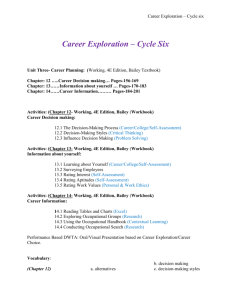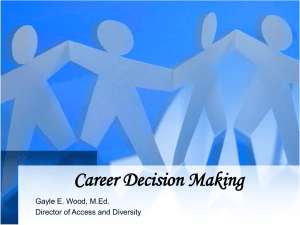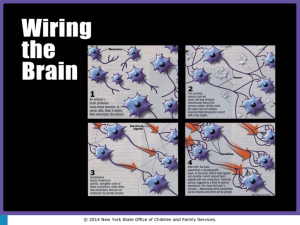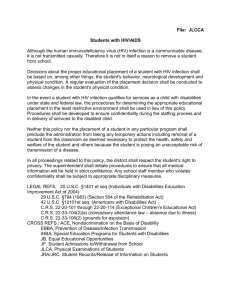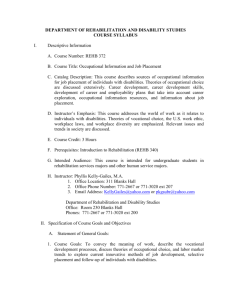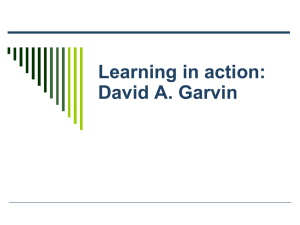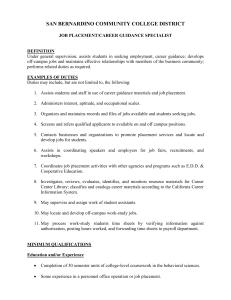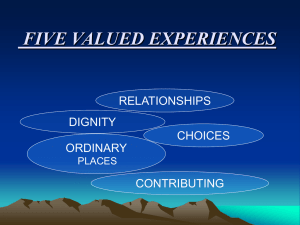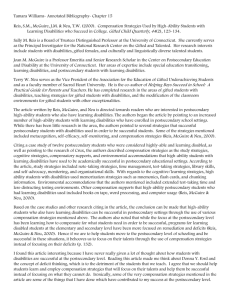Article - Career Development Process
advertisement
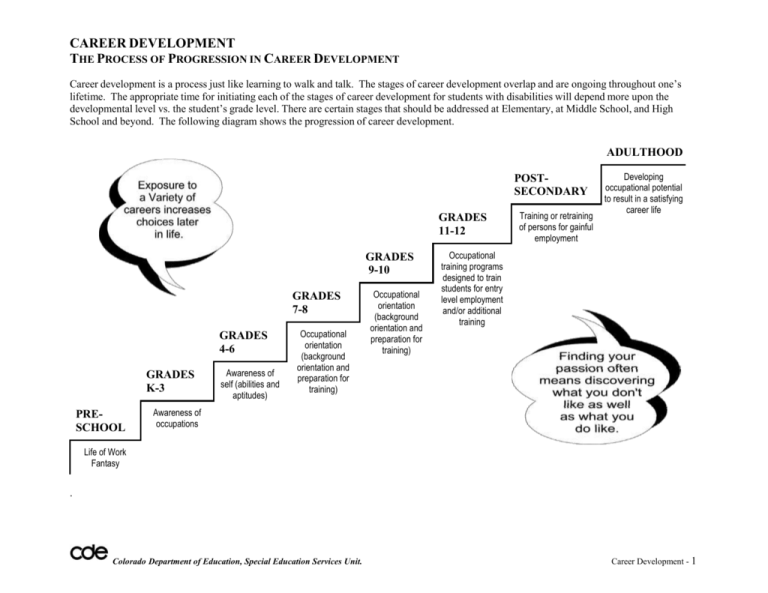
CAREER DEVELOPMENT THE PROCESS OF PROGRESSION IN CAREER DEVELOPMENT Career development is a process just like learning to walk and talk. The stages of career development overlap and are ongoing throughout one’s lifetime. The appropriate time for initiating each of the stages of career development for students with disabilities will depend more upon the developmental level vs. the student’s grade level. There are certain stages that should be addressed at Elementary, at Middle School, and High School and beyond. The following diagram shows the progression of career development. ADULTHOOD POSTSECONDARY GRADES 11-12 GRADES 9-10 GRADES 7-8 GRADES 4-6 GRADES K-3 PRESCHOOL Awareness of self (abilities and aptitudes) Occupational orientation (background orientation and preparation for training) Occupational orientation (background orientation and preparation for training) Training or retraining of persons for gainful employment Developing occupational potential to result in a satisfying career life Occupational training programs designed to train students for entry level employment and/or additional training Awareness of occupations Life of Work Fantasy . Colorado Department of Education, Special Education Services Unit. Career Development - 1 THE STAGES OF CAREER DEVELOPMENT1 Career awareness/orientation is the first stage of the process and should begin in the early elementary years. This stage really never ends. It is important for this stage to begin early in children's lives so they can develop self-awareness and feelings of self-worth/confidence. This will assist them in: (1) developing a work personality that helps them perceive themselves as workers; (2) becoming more aware of different jobs; (3) developing work values, attitudes and other attributes appropriate to their unique abilities and needs. If students with disabilities cannot acquire the skills during this stage, then adolescent and adult programs will need to give much more attention to them. Stages of Career Development PostSecondary Career exploration is the second stage of career development. This stage should be emphasized should be given a chance to examine firsthand the number of occupational groupings such as agricultural work, office work, home economics, public service jobs, business and industrial positions. They should be allowed to obtain various hands-on experiences, and be given the opportunity to examine their own particular set of abilities and needs, as related to the world of work, a vocational interests, leisure and recreational pursuits, and other roles related to their overall career development. 10-12 7-9 Career preparation represents a third stage of career development. This stage occurs usually during the senior high school years and finds the student beginning to develop and clarify personal, social and occupational knowledge and skills. Specific interests, aptitudes and competencies of the 1 CDE NEXT STEPS: Adapted with permission from PEATC NEXT STEPS publication. Colorado Department of Education, Special Education Services Unit. Career Development - 2 Career Placement, Follow-up Career Preparation Career Exploration The stages of career development overlap and are ongoing throughout one's lifetime. The appropriate time for initiating each of the stages of career development for students with disabilities will depend more upon the developmental level than on the grade level in school. Career Awareness/ Orientation Career placement, follow-up and continuing education is the final stage of the career education process. This stage of development may require the involvement of several community agencies to assure the individual of obtaining satisfactory vocational, leisure and independent living roles. Supported guidance and counseling services will be required. All people change at least somewhat in their interests and goals as they become older. Thus, career education is an important need of adults with disabilities as they redefine their priorities and needs. K--6 Stage/Time Frame Courses should be selected on this basis so a variety of experiences in and out of the classroom can be provided. A substantial experiential component should characterize this stage of development since many students with disabilities need an extended period of time to learn specific vocational skills. TRANSITION CONTINUUM / SUMMARY The intent of transition is to gradually move students from activities that are initiated early [around age 14] in the awareness process through the continuum of exploration and preparation and finally into career placement and/or continuing education [age 18-21]. Career placement and continuing education should be planned for in collaboration with adult service providers. The arrow designates the usual time for students to begin formal linkages with the appropriate agencies. Each student should have opportunities for career awareness, exploration preparation and agency linkages. The activities and agencies listed are only suggestions. Career Placement Awareness Exploration Preparation Continuing Education Communication Explore Career Clusters Self-Awareness Job Shadow Experiences In-school Jobs Mentorships Self Determination Post-Secondary Education Preparation for and Participation in CSE Meeting Volunteer Opportunities Work Based Learning Opportunities Career Interest Surveys and College Preparation Guidance focused follow-up Mental Health and Counseling Career Speakers Career Counseling Class electives based on Postsecondary Goals Department of Labor Job Shadowing Self Determination and Advocacy SSI Service learning Transition Assessment Job Seeking Skills (resumes, letters of interest, online portfolios, job search strategies, interviewing skills) Transition Assessment CareerZone Exploration CareerZone – Portfolio NYS Annual Career Plan For transition: Begin at age 12 Opportunity to participate the NYS Work Based Learning Programs o General Education Work Experience Program ACCES-VR o Community Based Work Programs (for students with disabilities) Career and Technical Education OPWDD – Day Supports and Services Postsecondary Strategies College and Disability Service Office Must be included in IEP development at age 15 OPWDD Employment and Training OPWDD – Residential and/or Family Supports School Exit: Connected with support services and adult agencies Adapted from Colorado Department of Education by RSE TASC to reflect NYS regulation

